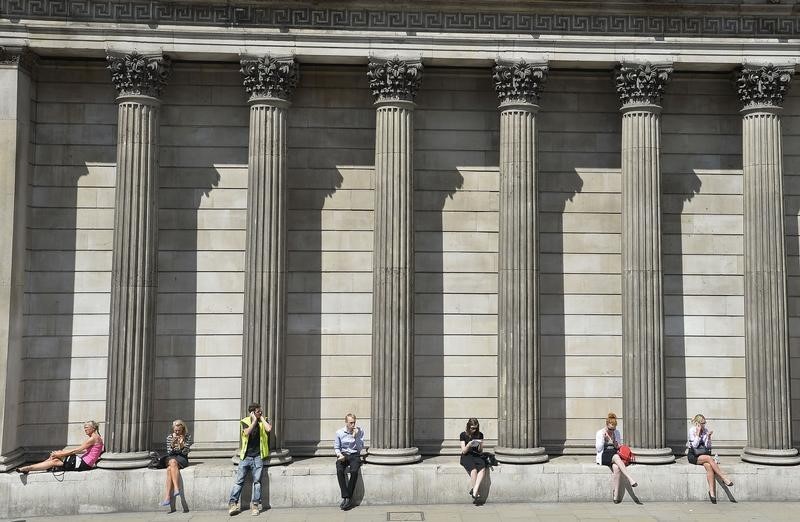By Jemima Kelly
LONDON (Reuters) - UK markets have not even begun to discount the chance that Britain could vote to leave the European Union next year, raising the risk of a blowup closer to the vote and complicating the timing of any Bank of England interest rate rise, top investors say.
Global asset managers speaking at this week's Reuters summit on the 2016 investment outlook said the absence of a firm date for the vote had kept the narrowing odds on "Brexit" and close-to-50/50 opinion polls off most market radar screens so far.
This failure to gradually discount those risks adds a critical element of uncertainty to UK gilts, equities and the pound going into next year, and fear about some major hiatus when a date of the vote is actually set may also cloud the outlook for a widely expected BoE rate rise next year too.
So far, there are only flickers of anxiety. Last week the cost of hedging against big price swings in the sterling/euro exchange rate, captured by one-year implied volatilities in the options markets that may cover the period around a referendum, jumped to a 3-1/2-year high.
Equivalent sterling/dollar implied volatility hit a seven-month peak.
But it's hard to discern any Brexit-related premia yet in UK stock or bond markets or even the spot price of sterling.
"Brexit is not really being discussed actively - it is not something where we are saying: this is a central part of our strategy," said Baring Asset Management Chief Investment Officer Ken Lambden at the Reuters Investment Outlook Summit in London. "I don't think anyone really believes it's going to happen yet."
"So if, as the process rolls on, and the polls start showing this could really happen, I think sterling would be incredibly weak," Lambden said. The longer-term impact may be more benign, but that won't preclude a big short-term shock, he said.
British Prime Minister David Cameron has promised a referendum on whether Britain should stay in the EU by the end of 2017, but investors are betting the referendum will be held around the middle or end of next year.
For central bank chief Mark Carney, who earlier in the month effectively ruled out a rate hike in early 2016 by saying near-zero inflation would be slow to pick up if rates stayed on hold for all of next year, the risk of turbulence surrounding a Brexit vote in the second half may force him to delay further.
Absent a clear date for the referendum, market strategists reckon the BoE will raise rates from historic lows next summer, but markets are pricing in a rate hike some time around the end of the year.
Still, all that could change once the date of the vote is set.
"Carney is very keen not to put a foot wrong; I think he wants an unblemished record," said Aberdeen Asset Management CIO Anne Richards.
"If he were to raise rates ahead of a Brexit vote that could slow the economy down. That is a much higher risk than saying: let's just let things run and see the result of Brexit."
Deutsche Bank (DE:DBKGn) strategist Oliver Harvey told clients an autumn referendum, along with a pick-up in fiscal tightening next year, could put a BoE hike on hold indefinitely.
"The window for policy exit may now close," he said. "Absent a remarkable volte-face, the MPC (monetary policy committee) has now relinquished its optionality for a hike in H1 next year. The problem is that it may be too late after that."
NO "ARMAGEDDON"
Several asset managers said sterling would be particularly vulnerable in the lead-up to the ballot - even more than it was ahead of last year's vote on Scottish independence.
But given that many felt any Brexit disruption would only be temporary and also because a sharp move in sterling might itself open a window for a post-Brexit BoE tightening, then losses should be limited. The central bank has frequently cited outsize sterling strength as a reason not to hike rates.
Man Group President Luke Ellis said a fall to $1.45 would be a buying opportunity.
But he cautioned that if the BoE were to raise rates on the basis of a weaker currency in the run-up to the referendum and then Britons voted to stay in the EU, sterling would gain sharply, pushing down inflation. Along with the rate hike, that would deal a "double-whammy" blow to the economy, he said.
Pictet Asset Management's head of multi-asset strategies, Percival Stanion, said a Brexit - the chances of which he put at 30-40 percent - would not be "Armageddon" for the British economy longer term. But it would certainly cause major disruption to inward investment decisions, and the financial industry and markets would be vulnerable.
Columbia Threadneedle Investments CIO Mark Burgess said a vote to leave the EU could endanger London's status as the global capital of foreign exchange trading. "There would be a land grab, and I wouldn't blame Frankfurt for doing that."
Given the BoE's dual role as guardian of financial system stability as well as monetary policy, the fallout from the vote could give it many headaches.

Rod Paris, Chief Investment Officer at Standard Life (L:SL) Investments, doubted the BoE would be hemmed in by the vote even though Brexit was "likely to be unhelpful - it creates investor uncertainty." The Bank would need to be convinced the outcome of the vote would have a durable impact on markets and the economy for it to radically alter its monetary policy course as a result.